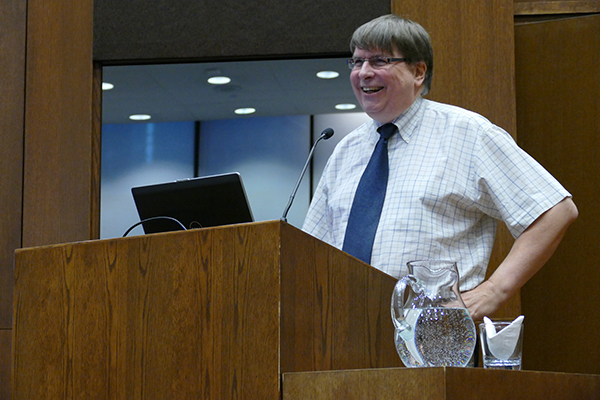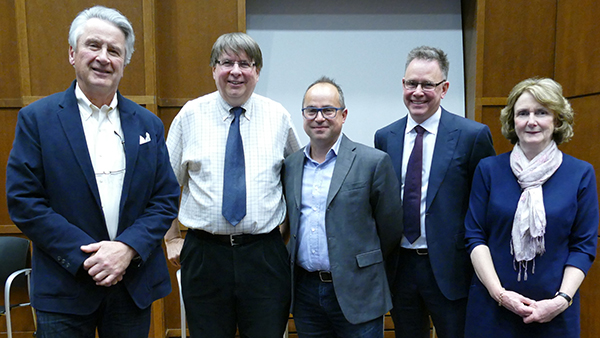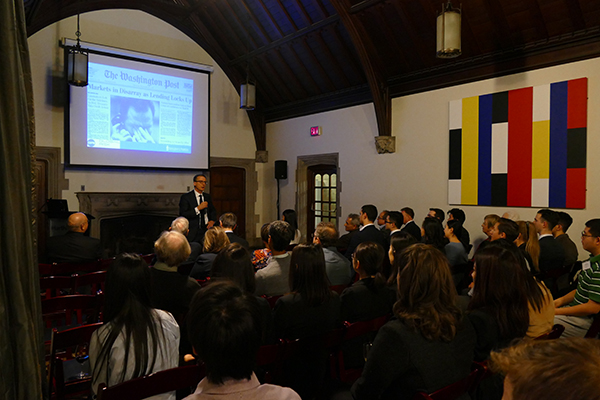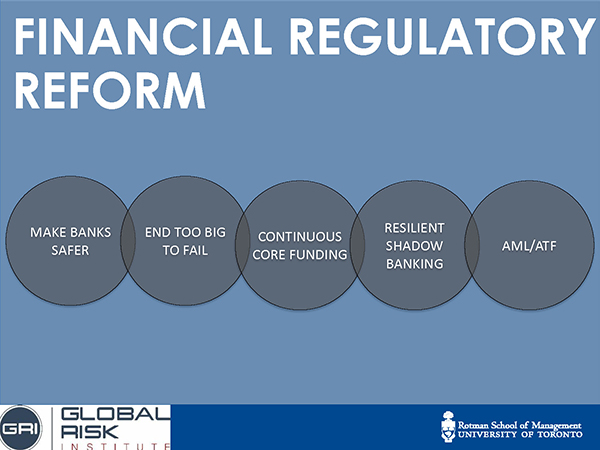Professor Jeffrey Smith was the Malim Harding Visitor and Rotman’s Professor Tiff Macklem delivered the Berkowitz Lecture.
→ Jump to the Berkowitze Lecture article
The Malim Harding Visitorship Lecture
February 2018

Professor Jeffrey Smith (Paul T. Heyne Distinguished Chair, University of Madison-Wisconsin) presented “Reflections on the Evaluation of Active Labo(u)r Market Policies: Two Cheers for Conditional Independence”. Smith’s work lies at the intersections of methodology, experimental evaluation, human capital, education and public policy, and is an exemplar of the two-way relationship that can exist between research and public policy: public policy informs his research and his research influences public policy. He has published extensively on a wide range of topics: evaluation of training, econometric methodology, post-secondary education, the assessment of education administration and the role of evidence-based public policy more generally.
In his talk to a capacity audience, Smith provided a lucid overview of the challenges of evaluating active labour market policies (ALMPs). ALMPs are designed to improve employment and earning outcomes for the unemployed – for example, by providing access to skills training. But do they work? The main question Smith considered was how to identify the effect on those who receive one intervention (or any intervention) relative to receiving no intervention. As we never observe both counterfactuals, estimated program effects are usually based on comparisons between those who participated in a program to those who did not. Unfortunately, program participation is non-random, as who chooses to go into a program, and when, depends on variables we don’t ordinarily measure. These unobserved variables may be confounded with program participation itself, making it difficult to identify the impact of the policy.
He introduced the notion of the conditional independence assumption (CIA), which posits that nature itself does conditional random assignment. If we condition on the right observed variables, what’s left over is random variation: we condition our way out of non-randomization. For that, we need rich data, beyond the standard demographic variables such as age, gender, location, years of schooling, and so on.
“Can you make a case that results from a study that relies on CIA are causal?” Smith mused. He pointed that that it’s really important to condition on past outcomes. If all you have is demographics, you’re going to get it wrong. If you have a lot of past outcomes and demographics you have some hope of getting it right, especially if you condition flexibly.
The absence of soft traits – e.g., the agreeableness of a participant – has been put forward as problematic when trying to interpret results. However, some European data sets do include such classifications and it turns out not to make a difference; the estimates stay stable.
Smith described the ongoing quest for the best way to approach analysis as applied epistemology. “Simply put,” he said, “how do we learn stuff from data?” The richer the data the better, of course, but you need to decide what information to gather for optimal usefulness. “What I want to do is argue that there are tools you can use to try to get a handle on what variables you need to have to make conditional independence assumption compelling and then write a paper that embodies that case. Justify, don’t announce. Make the case.”
His enthusiasm and expertise in this field engaged the audience fully, and the lecture was followed by a lively Q&A session. The complexities arising from the consideration of CIA are a reminder, Smith said, “that we are learning to evaluate.” And alongside that, and as important, is “that we are learning what the questions we should be asking are.”
Missed the lecture? Watch it here.
About the Visitorship
The Malim Harding Visitorship in Political Science & Economics was endowed in 1987 by the late C. Malim Harding, first Chair of Governing Council, to invite distinguished scholars to U of T with a special focus on current issues in public policy. Among those in attendance it was a particular pleasure to welcome Harding’s son Victor and daughter Debbie, who have always been staunch supporters of this annual event that is hosted on alternate occasions by the Department of Economics and the Department of Political Science.

The Berkowitz Lecture
March 2018 – with thanks to Yuan Yuan Jin for her contribution to this article.

The 2018 Berkowitz Lecture, “10 Years Later: Seven Lessons in Crisis Management from 2008”, was delivered by Professor Tiff Macklem, Dean of the Rotman School of Management. This annual lecture is presented by the Master of Financial Economics (MFE) program, in memory of Michael Berkowitz, former chair of the Department of Economics and founder of the MFE program.

In his presentation, Macklem observed that crises – such as VW’s faked diesel tests, Wells Fargo’s creation of two million fraudulent accounts, and the SEC trading systems breach – are happening with increasing frequency, even if they are not of the magnitude of the global financial crisis of 2008.
What is needed, he argued, is a move from crisis management to crisis leadership. Making a distinction between exogenous crises (typically natural disasters, unpreventable but which can be prepared for) and endogenous crises (man-made, preventable, start small and escalate with poor crisis management), Macklem focused on the latter, noting that situations continue to deteriorate because they are managed poorly.
He provided an overview of the events that prompted the systemic crisis of 2008 – the preceding solvency crisis of the Bear Stearns investment bank and including the nationalization of Fanny Mae and Freddie Mac, Lehman Brothers’ bankruptcy, the collapse of Iceland’s financial system and bank bailouts across Europe.
Macklem went on to propose what he described as “the 7Cs for crisis leadership”: 1. Contemplate further calamities; 2. Put in place contingency plans; 3. Calibrate to crush – aim to crush the crisis not merely to contain it; 4. Cooperate and coordinate – countries acting together looks less like a problem and hence is more reassuring; 5. Communicate – in good time and often, acknowledge seriousness; 6. Restoring confidence is essential; 7. Build better and more robust business culture – crisis is when this matters the most.
Crises go well beyond finance, Macklem noted, with effects that extend into health, security and food safety, for example, and with the potential to also create disruptions to the financial technologies on which we increasingly rely. He called for a focus on crisis prevention, while acknowledging that even with inspired efforts in prevention, financial crises will continue to occur – and thus investment in crisis leadership is vital as we occupy an increasingly complex, interconnected and interdependent world.

